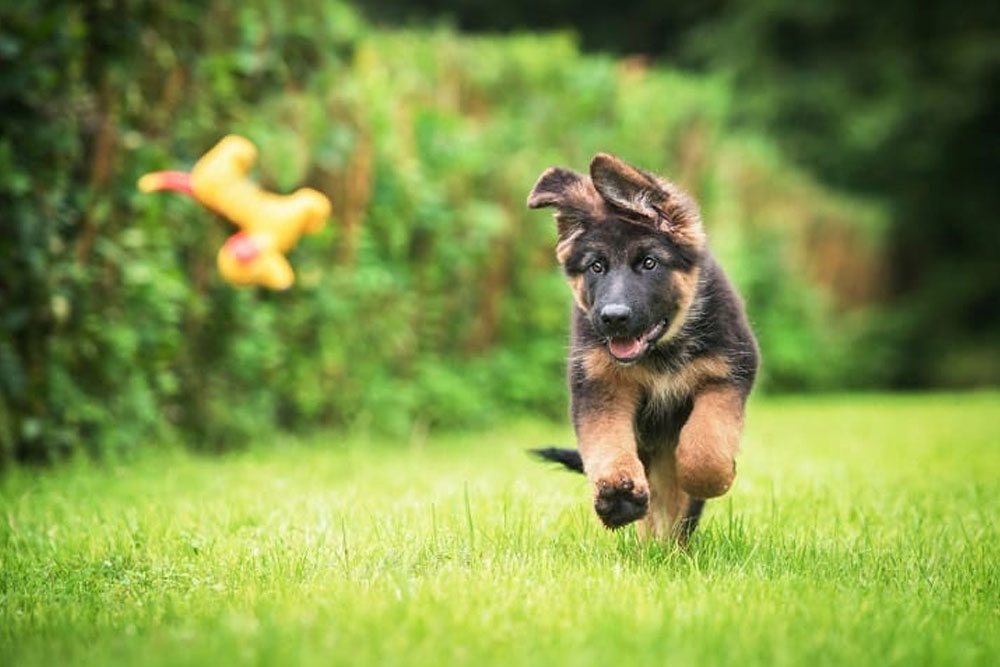German Shepherd Puppy Training is a vital aspect of raising a German Shepherd puppy, as it sets the foundation for their behavior, obedience, and overall development. German Shepherds are intelligent and highly trainable, making it essential to start German Shepherd training early.
In this article, we will delve into the importance of training for German Shepherd puppies and the benefits it offers. We will emphasize the significance of early training and socialization, highlighting how it helps them become well-mannered, confident, and adaptable adult dogs.
The article will provide an overview of the content, which includes discussions on training techniques, socialization exercises, and the role of positive reinforcement.
By understanding the importance of training, readers will be equipped with valuable insights to raise a well-behaved and balanced German Shepherd puppy.
Table of Contents
Understanding German Shepherd Puppy Training
German Shepherd puppies are a delightful addition to any family, but understanding their unique developmental stages, breed characteristics, and training considerations is crucial for their well-being and successful integration into your home.
Developmental Stages:
German Shepherd puppies go through various stages as they grow. The neonatal stage (0-2 weeks) is marked by their reliance on their mother for nourishment and warmth.
The transitional stage (2-4 weeks) sees them beginning to explore their environment and interact with littermates. The socialization period (4-14 weeks) is a critical phase where early exposure to various people, animals, and environments is essential for shaping their behaviour and reducing the risk of fear or aggression later in life.
Breed Characteristics and Temperament Traits:
The remarkable qualities of German Shepherds include their exceptional cognitive abilities, unwavering devotion, and impressive adaptability. They are often highly trainable and excel in various roles, such as working dogs, search and rescue, or as loving family companions.
They are protective of their loved ones and can be reserved with strangers, making early socialization crucial to ensure they become well-rounded and well-behaved adults.
Key Considerations for Training:
German Shepherd puppy training requires consistency, positive reinforcement, and patience. They thrive on mental stimulation and appreciate tasks that challenge their intellect.
Early training should focus on basic obedience commands, proper leash walking, and essential socialization exercises. Providing them with structure, positive experiences, and clear boundaries will help establish a strong bond and shape their behavior positively.
Consistent Routine for German Shepherd Puppies
Setting a positive and consistent routine is crucial when it comes to German Shepherd puppy training. By creating a structured environment, you can lay a strong foundation for their development and behavior. Here are a few essential factors to take into account.
- Establish a Regular Schedule: German Shepherd puppies thrive on routine. Set a schedule for feeding, exercise, playtime, and rest. Consistency in timing will help your puppy understand what is expected of them and reduce anxiety.
- Use Positive Reinforcement: German Shepherds respond exceptionally well to positive reinforcement techniques. By providing your puppy with treats, praise, and affection as a form of positive reinforcement when they demonstrate desired behaviors, you effectively reinforce their good conduct and aid in their comprehension of expected behavior patterns.
- Build Trust and a Strong Bond: Spend quality time with your puppy to build trust and strengthen your bond. Engage in interactive play, gentle handling, and provide plenty of love and attention. This will create a secure and loving relationship, making your German Shepherd puppy training sessions more effective.
- Basic Care and House-for German Shepherd Puppy Training: Ensure your German Shepherd puppy’s basic needs are met. Provide them with a comfortable and safe space, regular veterinary care, a nutritious diet, and proper grooming. House-training is essential, so establish a consistent routine for bathroom breaks and reward them for successful elimination outside.
- Supervise and Manage the Environment: German Shepherd puppies are curious and may explore their surroundings. Puppy-proof your home to prevent accidents or damage. Use baby gates or crate training to create safe spaces and gradually introduce them to different areas of the house.
Teaching Essential Commands with Positive Reinforcement
Basic obedience of German Shepherd Puppy Training is an important part of raising a well-behaved and obedient German Shepherd puppy.
Here are some key tips for effective German Shepherd Puppy Training using positive reinforcement techniques:
- Start with Sit Command: Begin by teaching your puppy to sit. Hold a treat above their nose, then slowly move it back over their head. As their attention fixates on the treat, the natural response of German Shepherds is to instinctively lower their hindquarters into a seated position. Once they sit, say “sit” and give them the treat.
Repeat this process, gradually introducing the verbal command without luring them with the treat. Reward and praise them each time they successfully perform the command. - Introduce Stay and Come Commands: Once your puppy has mastered the sit command, you can progress to teaching stay and come. Start by asking them to sit, then give the verbal command “stay” while taking a step back.
If they remain in the sitting position, return to them and reward them. Over time, incrementally extend the distance and length of time for which your German Shepherd is expected to maintain the “stay” command. For the come command, use a joyful tone and call their name followed by the command “come.” When they come to you, reward them with treats and praise. - Positive Reinforcement: Positive reinforcement is crucial for German Shepherd Puppy training. Reward your puppy with treats, verbal praise, and affection whenever they successfully perform a command.
The establishment of this positive connection serves as a source of motivation for German Shepherds to consistently replicate the desired behavior. Avoid punishment or harsh corrections, as it can lead to fear or resistance in their training. - Consistency and Practice: Consistency is key in German Shepherd puppy training. Practice short training sessions multiple times a day to reinforce the commands. Keep the sessions fun, engaging, and end on a positive note.
By progressively incorporating distractions or engaging in training sessions across diverse environments, you can gradually elevate the level of difficulty for your German Shepherd, further enhancing German Shepherd Puppy training and adaptability. - Use Rewards and Praise: Rewards and praise play a significant role in motivating during your German Shepherd Puppy Training.
Find out what types of treats or rewards they find most enticing, such as small training treats or praise with an enthusiastic tone. Use these rewards consistently to reinforce their good behavior and encourage their continued progress.
Early Socialization for German Shepherd Puppies
Early socialization is crucial for German Shepherd puppies as it helps shape their behavior, build confidence, and promote positive interactions with people, animals, and different environments.
By exposing them to a variety of experiences in a controlled and positive manner, you can help them develop into well-rounded and adaptable dogs. Here are key points to consider:
- Early Socialization Benefits: Early socialization during the critical period of 4-14 weeks helps puppies become more comfortable and confident in various situations. It reduces the likelihood of fear or aggression later in life. Proper socialization promotes better communication skills, helps prevent behavior problems, and fosters a well-adjusted adult German Shepherd.
- Introduce New People: Expose your puppy to a range of people, including different ages, genders, ethnicities, and appearances. Encourage gentle interactions and reward positive behavior. Gradually increase the level of interaction and exposure to different environments, such as parks, cafes, or pet-friendly stores.
- Introduce Other Animals: Arrange controlled encounters with friendly, well-vaccinated dogs and other animals, ensuring the interactions are positive and supervised. This allows your puppy to learn appropriate social skills, body language, and how to engage in play. Puppy classes or supervised playgroups can be beneficial for this purpose.
- Exposure to Environments: Introduce your puppy to various environments, such as urban areas, rural settings, different flooring surfaces, and common household objects.
While granting them the freedom to explore at their own rhythm, it is crucial to offer reassurance and positive reinforcement to your German Shepherd, fostering their confidence and encouraging their natural curiosity. Gradually increase the complexity of environments to help them become adaptable and confident in different settings. - Positive Experiences and Techniques: Use positive reinforcement techniques during socialization. Acknowledge and reward your puppy’s tranquil and self-assured demeanor by offering them treats, praise, and affection, reinforcing their positive behavior and promoting a sense of calmness and confidence.
Use gentle exposure techniques, such as desensitization and counter-conditioning, to help them overcome fears or anxieties. Ensure that experiences are positive, stress-free, and gradually build on their confidence.
Building on Basic Obedience for German Shepherd Puppies
Building on basic obedience training, advanced training and mental stimulation are essential for German Shepherd puppies to further develop their skills, intelligence, and overall well-being.
These activities not only provide mental engagement but also strengthen the bond between you and your puppy. Here are a few essential factors to take into consideration:
- Advanced Commands and Skills: Once your puppy has mastered basic commands like sit, stay, and come, you can introduce more advanced commands such as down, heel, and leave it. Break these commands down into smaller steps, reward incremental progress, and gradually increase the level of difficulty. Training sessions should be short, focused, and consistently reinforced.
- Recall and Off-Leash Training: Teaching a solid recall command is crucial for off-leash reliability. Start in a controlled, secure area and gradually increase the distractions and distance. Use high-value treats or toys as rewards to motivate your puppy. Remember to always prioritize their safety and gradually work up to off-leash German Shepherd Puppy training in open areas.
- Mental Stimulation Exercises: German Shepherd puppies have an active and intelligent nature, requiring mental stimulation to keep them engaged. Incorporate puzzle toys, treat-dispensing toys, and interactive games that challenge their problem-solving abilities. Hide-and-seek games or scent work activities can tap into their natural instincts and provide mental exercise.
- Agility and Advanced Training Classes: Enroll your German Shepherd puppy in agility or advanced German Shepherd Puppy Training classes. These activities provide physical exercise, mental stimulation, and opportunities for bonding. They can learn more complex commands, navigate obstacle courses, and engage in teamwork exercises. These activities help channel their energy and intelligence in a structured and fun way.
- Trick Training and Canine Sports: Teaching your puppy fun tricks not only stimulates their mind but also enhances their coordination and responsiveness. Teach them to wave, roll over, play dead, or fetch specific objects.
You can also explore canine sports such as obedience trials, rally obedience, or nose work, where they can showcase their skills and excel in a competitive environment.
Addressing Common Challenges
German Shepherd puppies, like any other breed, may exhibit certain challenging behaviors as they grow and learn. Understanding how to address these common challenges can help you guide your puppy towards appropriate behavior and ensure a harmonious household.
Here are some tips for dealing with chewing, biting, separation anxiety, and behavior problems:
Chewing, Biting, and Nipping:
German Shepherd puppies have a natural tendency to explore the world with their mouths, which can result in chewing, biting, and nipping behaviors.
Provide them with appropriate chew toys, redirect their attention to these toys when they exhibit unwanted chewing behavior, and praise them when they engage with the toys.
Consistency, positive reinforcement, and proper supervision are key to discouraging inappropriate chewing and promoting desirable behavior.
Separation Anxiety and Fear-Based Issues:
German Shepherds are known to be loyal and attached to their families, which can sometimes lead to separation anxiety when left alone. Gradually acclimate your puppy to being alone by starting with short periods and gradually increasing the duration.
Create a calm and comfortable space for them, leave them with engaging toys, and consider using background noise, such as calming music or a white noise machine, to provide a soothing environment.
If fear-based issues arise, consult with a professional dog trainer or behaviorist to develop a desensitization and counter-conditioning plan tailored to your puppy’s needs.
Correcting and Preventing Behavior Problems:
Consistency and positive reinforcement are essential when correcting and preventing behavior problems. Identify the triggers or situations that lead to undesirable behavior and work on redirecting their attention, providing alternative behaviors, and rewarding appropriate responses.
Set clear boundaries, establish rules, and avoid reinforcing unwanted behaviors. Consult with a professional dog trainer for guidance on specific behavior problems and to develop an effective German Shepherd Puppy Training plan.
How long should training sessions be for a German Shepherd puppy?
Training sessions for German Shepherd puppies should be short and frequent, ideally around 10-15 minutes several times a day. Puppies have shorter attention spans, so keeping the sessions brief helps maintain their focus and engagement.
Should I crate train my German Shepherd puppy?
German Shepherd Puppy training can be beneficial for puppies. It provides them with a safe and secure space and aids in house-training. Proper crate training techniques, including positive associations and gradual introductions, can help your puppy view the crate as a positive and comfortable place.
When should I start socializing my German Shepherd puppy?
Socialization should begin as early as possible, ideally around 8-10 weeks of age. Early socialization helps your German Shepherd puppy develop positive associations with various people, animals, and environments, contributing to their overall confidence and well-being.
How do I teach my German Shepherd puppy to walk on a leash?
Teaching your German Shepherd puppy to walk on a leash requires patience and consistency. Start by introducing the leash gradually and using positive reinforcement techniques. Encourage your puppy to walk beside you with treats, praise, and rewards.
How can I prevent my German Shepherd puppy from biting?
Biting is a natural behavior for puppies, but it’s important to redirect and teach them appropriate chewing habits. Offer plenty of chew toys, redirect their biting to appropriate items, and provide positive reinforcement when they chew on approved objects.
Conclusion
German Shepherd puppy Training is a rewarding and fulfilling experience that will shape their behavior and ensure a strong bond between you and your furry companion. By following the comprehensive guide outlined in this article, you’ll be equipped with the knowledge and techniques to raise a well-behaved and obedient German Shepherd puppy.

I’m David, an expert contributor and writer, with two furry friends of my own, I know the challenges of raising and caring for dogs. From training to nutrition and health, my goal is to provide valuable insights and advice to help create strong bonds and happy, healthy lives. Find me in Twitter.




